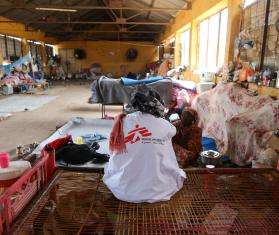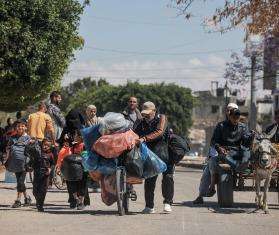NEW YORK/KHARTOUM, MAY 23, 2023—The international medical humanitarian organization Doctors Without Borders/Médecins Sans Frontières (MSF) condemns the unacceptable harassment of its staff and the violent and repeated looting and occupation of its medical premises and the facilities it is helping to run and support in Sudan. This shocking disregard by warring parties for humanitarian principles and international humanitarian law has impeded MSF’s ability to provide health care to people at a time when it is desperately needed.
"We are shaken and appalled by these deplorable attacks,” said Jean-Nicolas Armstrong Dangelser, MSF emergency coordinator in Sudan. “People are in a desperate situation, and the need for health care is critical. These attacks make it so much harder for health care workers to help. It’s senseless.”
MSF, which runs medical projects in ten states in Sudan, has been trying to scale up its medical activities since intense fighting broke out between the Sudanese military and the Rapid Support Forces (RSF) on April 15. These efforts have been hampered by violence, armed incursions and occupations of medical facilities that traumatize staff and patients, and looting of medicines, supplies, and vehicles, as well as administrative and logistical challenges.

Sudan 2023 © MSF
“We are experiencing a violation of humanitarian principles, and the space for humanitarians to work is shrinking on a scale I've rarely seen before,” Dangelser said. “After the looting of one of our medical warehouses in Khartoum, fridges were unplugged and medicines removed. The entire cold chain was ruined so the medicines are spoiled and can’t be used to treat anyone.”
Warring parties must ensure the safety of medical personnel and health facilities, allow safe passage of ambulances and people seeking health care, and facilitate access and rapid and unimpeded movement for humanitarian workers, organizations, and supplies, said MSF. Although a nationwide ceasefire was announced between the warring parties on May 20, local ceasefires have not always been respected in the past.
These attacks are part of a wider trend of both warring parties disregarding civilian lives, infrastructure, and health facilities. As of May 22, the World Health Organization has documented 38 attacks on health care since the conflict began. Hospitals and health care workers are protected under international humanitarian law, but there are reports in Sudan of the occupation of hospitals by armed groups that can put patients, health care workers, and medical structures at risk.
These incidents come at a time when the conflict is having a dire impact on people in Sudan. People in Khartoum, Darfur, and other places where the fighting is most intense continue to suffer terribly amid ongoing violence that has resulted in gunshot wounds, sexual violence, stabbing, and explosions. Countrywide, people face shortages of food and drinking water—forcing people to be on the move to try to meet their basic needs. Access to humanitarian support and health care is vital, but the Sudanese health care system is already struggling with a lack of essential supplies.
Administrative and logistical challenges are also impeding MSF’s medical activities as moving supplies from one part of Sudan to another can be extremely difficult. Similarly, although MSF was able to bring emergency teams into Sudan during the first weeks of the conflict, it has since been challenging to obtain permission for them to travel to project locations or to secure visas for additional staff.

About MSF in Sudan
MSF runs medical projects in Al-Jazeera, El-Gedaref, Kassala, Khartoum, Red Sea, North, West, South and Central Darfur, and Blue Nile states in Sudan. This includes treating war-wounded people in Khartoum and North Darfur, providing health care and water and sanitation services for refugees and displaced people in Al-Gedaref and Al Jazirah states, and providing donations of medical and other supplies to health facilities across the country.




